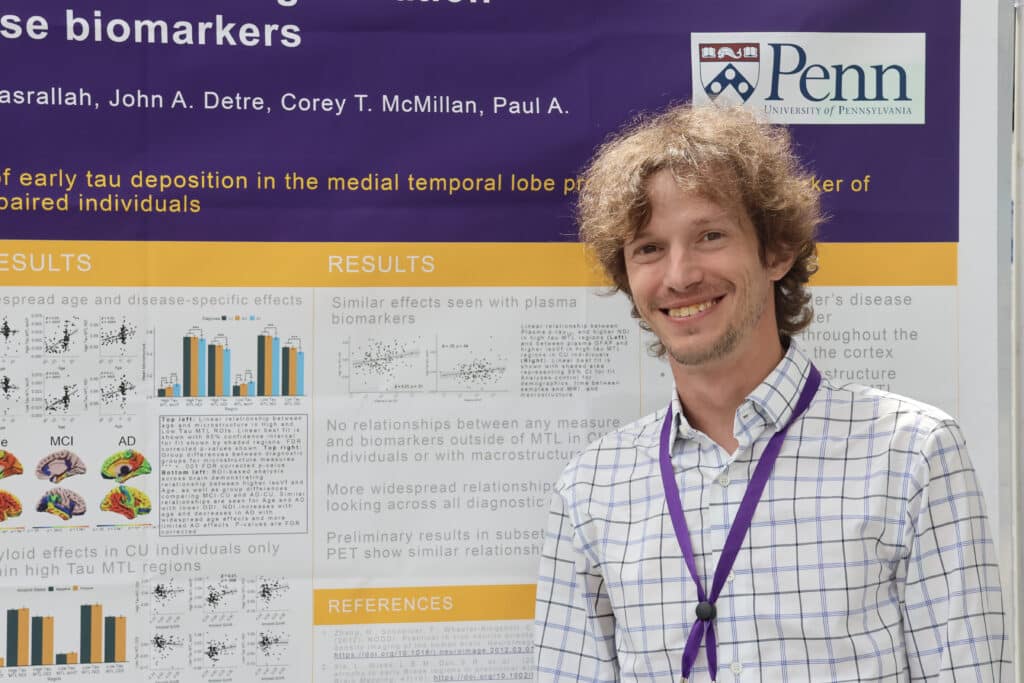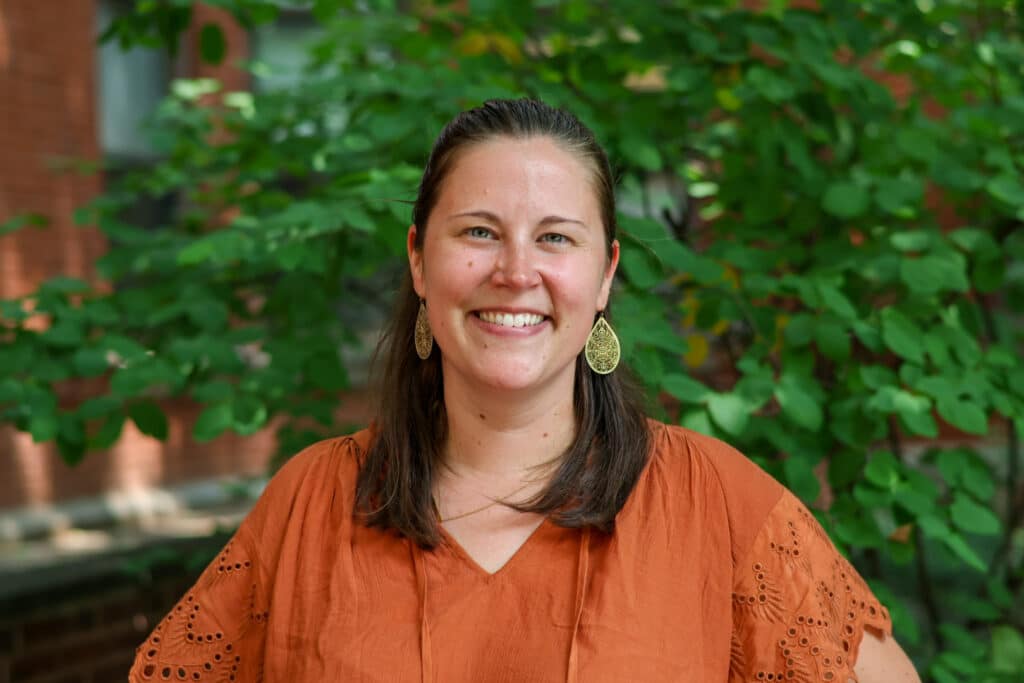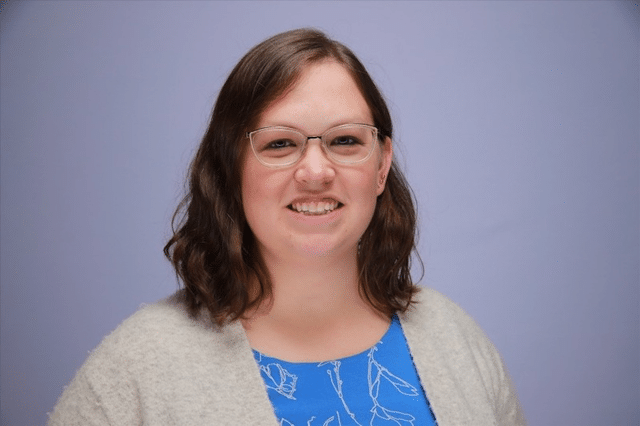By Meghan McCarthy
This year, the Christopher Clark M. Scholar program at the Penn Memory Center (PMC) welcomes four new innovative researchers.
Christopher M. Clark, MD, was a pioneer in the world of Alzheimer’s disease (AD) research and care. After accepting a faculty appointment in the Department of Neurology at the University of Pennsylvania in 1990, Dr. Clark led the Clinical Core of the Alzheimer Disease Center (ADC). He also served as a founding member of the PMC, which he directed.
In 2020, PMC’s scholars program was renamed to honor Dr. Clark and his legacy at Penn and in the field of dementia research.
Previous Clark Scholars have addressed topics of health equity, biotechnology, stigma, and biomarker research, amongst many focuses and gone on to win awards for work in supported decision making, leadership in palliative care, and exceptional contributions to the field.
PMC is excited to welcome another talented group of physicians and researchers into the program.

Christopher Brown
Christopher Brown
Christopher Brown, MD, PhD, is a physician scientist originally from St. Louis. After completing his neurology residency at Penn in June, Dr. Brown is excited to begin his training as a Clark Scholar.
Dr. Brown’s work is centered on proteins which cause AD in each region of the brain. Specifically, he is interested in how connections between different regions, or their wiring, may serve as a roadway for proteins to spread throughout the brain.
“Currently, we use a one size fits all approach to predicting how proteins spread,” said Dr. Brown. “We are trying to predict their trajectory on an individual patient basis, which fits into an overall research focus on heterogeneity.”
At PMC, heterogeneity is a key focus of many research studies and clinical programs. Dr. Brown’s work will make an excellent addition.
Having an understanding of this trajectory may impact the structure of patient therapeutics.
“Our research takes patients out of being a population and brings it back home to them,” said Dr. Brown. “Understanding how each person’s brain has formed and connects will help us understand how the disease is experiences and also who will benefit most from treatments.”
Specifically, Dr Brown’s work may affect how clinicians treat and care for their patients. For example, some patients may benefit from treatment at an earlier stage than others.
As a clinician, Dr. Brown has a background in cognitive neurology, which integrates brain functioning with behavior.
“I’m really excited to be a Clark Scholar and get more involved at PMC,” said Dr. Brown. “The center has amazing research coordinators, clinicians, and other researchers. There is a large support to connect research to clinical care for our patient community.”
Outside of his research, Dr. Brown has two young boys who keep him busy.
“My oldest is a great research assistant, and likes to hit buttons on the computer,” said Dr. Brown. “So, if you see something I’ve done, there’s a chance a two-and-a-half-year-old has contributed in some way.”
Dr. Brown received his medical degree from the University of Kentucky College of Medicine and attended Washington University for his BA.

Claire Erickson
Claire Erickson
Claire Erickson, PhD, MPA, is a postdoctoral fellow at the Perelman School of Medicine and has collaborated with the Penn Program on Precision Medicine (P3MB) team for the past year.
In her graduate and postdoctoral training, Dr. Erickson has focused on how patients with AD receive their biomarker testing results.
“This work impacts patient’s day to day lives,” said Dr. Erickson. “It focuses on how to adequately prepare people to learn that they have biomarkers of AD. We’re trying to be very intentional about the process of disclosure from the lens of patients learning it and also clinicians giving it.”
Specifically, Dr. Erickson looks at how biomarker disclosure impacts patient’s identity and how patients respond to the information. Does it make them anxious and/or depressed? Does it motivate patients to change their lifestyle, such as diet or exercise?
Since beginning her time at Penn, Dr. Erickson has collaborated with Emily Largent, PhD, JD, RN, on biomarker disclosure research.
“[Dr. Emily Largent] is just an incredible researcher, and having her support and mentorship has allowed me to grow and deepen my understanding of this field,” said Dr. Erickson.
Beyond biomarker disclosure, Dr. Erickson has collaborated on work in supported decision making.
Much of her work integrates research with public health.
“I take a multidisciplinary approach to science,” said Dr. Erickson. “I’m interested in how we can take what we’re doing in Alzheimer’s research and apply that to aging and long-term care policy.”
Dr. Erickson looks forward to networking as a Clark Scholar. The program will provide also provide funding for her first fully independent project.
“This is such an awesome opportunity towards my independence as a researcher,” said Dr. Erickson.
Dr. Erickson received her bachelor’s of science degree in neuroscience at Ohio State University, and both her master’s in public affairs and PhD in neuroscience from the University of Wisconsin-Madison.

Catherine Norise
Catherine Norise
Catherine Norise, MD, MTR, first began collaboration at PMC as a cognitive neurology fellow in 2022. She is excited to continue work as a Clark Scholar.
Dr. Norise is interested in the language recovery process of neurogenerative diseases and advancing potential therapeutics.
As a Clark Scholar, Dr. Norise will primarily focus on language and non-invasive brain stimulation for patients with neurodegenerative language disorders.
“There is so much we don’t understand about best fitting therapies to our patients,” Dr. Norise. “One of my goals in the upcoming year is to help understand markers for success in therapeutic areas.”
Currently, there are only a few treatment options available for such language disorders.
“Speech therapy is helpful, but it’s therapy, it’s not a treatment. Having more options would be a very meaningful change for our patients, and something I am excited to contribute to,” said Dr. Norise.
As a college student, she worked with Roy Hamilton, MD, MS, and was inspired by the center’s diagnostic processes and research studies. She then continued work in the Laboratory for Cognition and Neurostimulation, which was sponsored by PMC, before going to medical school at the University of Pennsylvania.
“I would shadow PMC Consensus meetings on Monday mornings, and was in awe,” said Dr. Norise. “To have the opportunity to come back and work at PMC as a physician and be able to participate in those meetings has been a dream come true for me.”
Dr. Norise has an extensive board game collection and spends her spare time at board game cafes throughout the city.
Dr. Norise received her BS in Haverford College before attending Penn for medical school and her master’s in translational research. She completed her residency at the University of Massachusetts.

Ellen Munsterman
Ellen Munsterman
Ellen Munsterman is a third-year doctoral candidate at Penn’s School of Nursing. She has worked as a nurse since 2011. For the past decade, she has primarily worked in medical/surgical areas and currently works on an Acute Care for Elders (ACE) unit.
“The entirety of my career has been seeing challenges for older people in hospital settings,” said Munsterman. “It’s driven my research questions. I’m excited to have hospitalized persons with dementia and their caregivers reflected in nursing research.”
Munsterman’s doctoral work focuses on the care of older persons with dementia in hospital settings.
“I’ve been exploring how the term ‘dementia friendly’ is used in literature with respect to hospitals,” said Munsterman. “The term has been used to describe community initiatives and long-term care, but I’m trying to develop a more complete definition for programs and hospitals.”
She is exploring this through the perspectives of clinicians, caregivers, and individuals who live with dementia.
Specifically, her goal is to create a framework for defining ‘dementia friendly’ visitation in a hospital setting.
“When you have dementia, the hospital setting is especially challenging because the environment and routine are unfamiliar,” said Munsterman. “A goal of mine is to contribute to the hospital experience for persons with dementia.”
Dementia friendly policies can and may include additional educational trainings for staff and modifications to the physical space, such as labels and lighting adjustments.
As a Clark Scholar, she is most excited for mentorship and experience with like-minded individuals in the field of dementia care.
Outside of work, she enjoys hiking and camping.
“I have a National Parks Passport book that I’m very dedicated to getting stamped,” said Munsterman.
Munsterman got her BS in Nursing at Texan Christian University before receiving her master’s as a clinical nurse specialist (also at TCU), focusing on the adult and gerontological patient population.